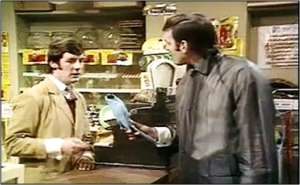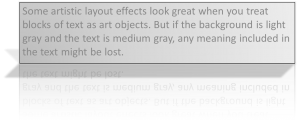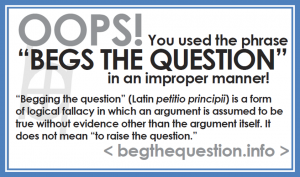Rebecca Lyles's Blog, page 11
August 30, 2014
The mother load
 In just one week, I’ve seen two smart people use the expression mother load in reference to a large amount of something. I’ve also seen it used in a book by one not-so-smart writer—and overlooked by a sleepy editor.
In just one week, I’ve seen two smart people use the expression mother load in reference to a large amount of something. I’ve also seen it used in a book by one not-so-smart writer—and overlooked by a sleepy editor.
Listen up, folks, it’s mother lode. L-O-D-E. The term, from the mining industry, refers to a major deposit of gold or silver ore. It is also used to describe something valuable or in great abundance, and that’s where people get into trouble. Perhaps it suggests the idea of “mother of all loads,” but that’s neither its origin nor its current meaning.
There is only one way the term mother load makes any sense. Imagine a mythical family in which each member is assigned a separate basket of laundry to wash, dry, and fold. You know the family is mythical because the children are actually doing laundry.
The family responsibilities are:
Father— his own T-shirts, shorts, underwear, socks, and pajamas
Son—his own T-shirts, shorts, underwear, socks, and pajamas
Daughter—her own T-shirts, shorts, underwear, socks, and pajamas
Mother—her own T-shirts, shorts, underwear, socks, and pajamas, anything that requires special handling, jeans, skirts, dresses, blouses, slip covers, curtains, school uniforms, soccer uniforms, ballet tutus, Halloween costumes, choir robes, sheets, workout clothes, yoga clothes, pillowcases, blankets, bath towels, hand towels, kitchen towels, beach towels, tablecloths, napkins, bathmats, dusting cloths, patio cushions, and the dog bed.
In the sense that the mother load is the largest, the term is appropriate here.
So feel free to use it, but only if you’re writing about laundry.
August 23, 2014
Judge not …
It’s bad to be judgmental, right? Evaluating people by appearance, social status, the kinds of cars they drive, how much money they make… we’re all too evolved for that.
And is it ever reasonable to assume good character based on perfect grammar and charisma? Of course not. Countless public figures have been great communicators and equally great scoundrels.
But how about using the same criteria to evaluate people as professionals or experts? My daughter’s English teacher once sent home a note announcing, “This is going to be a pilate project.” The teacher was the cheerleading coach who taught a little English on the side. Incompetent. But perky.
Comedian Jeff Foxworthy tells us that nobody wants to hear his brain surgeon say, “Al’ight now what we’re gonna do is, saw the top of your head off, root around in there with a li’l ol’ stick and see if we cain’t find that dad-burn clot.”
A recent Internet headline asked, “When is a marriage passed the point of no return?” I was intrigued by the use of passed (a verb) instead of past (a preposition). The first paragraph contained another gem: “whose to blame?” (instead of who’s, meaning who is). I wondered how a psychologist or other educated therapist could make such mistakes—and why there was no editor in sight. A short bio at the end revealed that the author was a 26-year-old journalist who had been married for six months. Some expert.
The English teacher has a responsibility to set a good example for her students. Maybe Foxworthy’s surgeon could be excellent at his job without speaking proper English. But the joke is that if he communicates like that, what other classes did he miss in med school? And the journalist, besides being woefully under-qualified to advise on the subject, blew her credibility before the article even began.
In some lines of work, people don’t necessarily think good communication skills matter. Building contractors. Artists. Professional athletes. But all of these people communicate, and it’s a plus for those who do it well. Communicating correctly will not make you better at any of these jobs, but doing it badly could hurt you.
Much has been written about personal appearance in the workplace. Multicolored hair, tattoos, and facial piercings are no problem if you work at Guitar Center or a motorcycle shop (in fact I think they might be required). But corporate America gets to decide how they want you to look. And people who greet the general public in commerce or food service are universally expected to appear clean, pleasant, and appropriately dressed.
Similarly, clear and correct communication conveys an air of professionalism and credibility. No amount of grooming, designer clothing, or shoe-polishing can overcome the impression left by bad writing and speech habits. So if you’re serious about career success, don’t create obstacles for yourself.
Does that mean your grammar always has to be perfect? In a few cases, no. But the communication has to be effective and appropriate for the situation. If you’re Yogi Berra or Charles Barkley, your personality and humor allow for liberties with the language because it’s part of the shtick. So if you’re going to butcher the language as much as they do, you’d better be as charming and clever as they are.
In other cases, grammar matters very much. As a hiring manager, I reviewed many application letters for technical writer positions. One applicant typed the wrong company name in the address block, misspelled my name, and boasted of “atention to detail, good writing skills, and exellent grammer.”
Time to be judgmental? You bet.
August 16, 2014
Humblebragging and business
Sometimes also called back-door-bragging, the fine art of humblebragging is self-promotion disguised as a complaint. To be clear, simple self-promotion is not humblebragging. You must appear to be trying for sympathy. “Poor me, woe is me, you should be glad you’re not me…”
I first became aware of this technique many years ago when I belonged, briefly, to a women’s social organization whose name sounds a little like a triple-A baseball team. (Not quite the Major League, but getting there.) At their meetings, the ladies sat around and complained about problems most people don’t have:
It’s impossible find a good Mercedes mechanic in this town!
Our pool service did not show up on the right day—again!
I simply cannot find a refrigerated facility that stores furs for the summer!
Andrew is having the worst trouble in school! He tested out of all the AP math courses and they have nothing advanced enough for him.
Someone start a telethon for these people!
The real messages: I have an expensive car, a pool, fur coats, and a smart kid.
Humblebragging is one of the most transparent of self-promotion techniques, and It’s hard to believe anyone in business would fall for it. But apparently they do, because the practice persists.
I’m sooo busy because clients won’t talk to anyone else. They insist on talking to me!
Oh no—more meetings! Out of 600 people, why was I selected to represent our department on the Presidential Task Force?
Not another request for a media interview! I am so tired of being the go-to expert on this subject!
I’m going to have to lock my office door. Everyone comes in here, asking for my advice!
I haven’t taken a vacation in years because they just can’t spare me for two weeks!
If you’re tempted to say something like this, think about how it will affect the people around you. If they are struggling to get their careers started, they will not feel sorry for you. In fact, they might want to stick out a foot and trip you the next time you walk by. And if you’re struggling to get your own career started, this practice will do you no good.
Imagine announcing at a Weight Watchers meeting that you can’t find clothes small enough to fit you. Or that, no matter how much chocolate you eat, you just can’t seem to gain an ounce. Or that your skinny thirteen-year-old daughter keeps borrowing your jeans. Sympathy? You’d be lucky to escape with your life.
The humblebragging at the women’s social group reached its pinnacle in one perfect, ridiculous example. The city’s exclusive residential area, Old Fig Garden, featured a shaded boulevard and grand old homes with beautiful, mature trees. When tree rats invaded a few attics, the neighborhood fire station stocked special bait boxes for the nearby residents. The problem was unique to Old Fig, and the local newspaper encouraged residents to pick up their bait boxes.
At one ladies’ group meeting, amidst the tea-sipping and complaints about Mercedes upkeep and inadequate fur storage, one woman rose above the chatter with a loud whine, “Oh dear, it’s late. I have to go by the fire station to get my rat poison.”
In other words, Oh yeah? Well I live in Old Fig Garden and you don’t.
Rat poison. Now that’s some Major League humblebragging!
August 9, 2014
Purgers and hack-quisitions
 You work for a small-to-medium-sized company, and you’re the ideal employee with outstanding performance reviews. Congratulations! Your small-fish company has just been gobbled up by a much larger one.
You work for a small-to-medium-sized company, and you’re the ideal employee with outstanding performance reviews. Congratulations! Your small-fish company has just been gobbled up by a much larger one.
At last you don’t have to explain to people who your employer is, because everybody knows. It’s a household name. Salary and benefits are good. This could be your big break, the beginning of a stellar career that shoots you to the top of the corporate ladder. Or not.
Don’t rush out and get new headshots for your Forbes cover just yet.
You might glide into a long-term career with the new company, but update your resume and reactivate your network of contacts just the same. The corporate welcome sounds encouraging at first, and you will be tempted to believe it. But—guaranteed—all company communication comes right out of a playbook.
Huge companies acquire smaller ones for a number of reasons. Taking on hundreds (or thousands) of redundant employees is not one of them. It might not happen immediately, but within two or three years, staff will be reduced. Over time, fewer and fewer of your original colleagues will remain.
It’s easy to lay off an entire department of worker bees. Just reorganize, eliminate their job functions, and give everyone a token severance package. But middle managers making good salaries are a little more of a problem. The formula is: Assign them the dirty work (firing lower-level employees) and caution them not to say “I’m sorry” because it creates a potential vulnerability in case of litigation. They must tell the employee that the firing decision was theirs alone and they were not pressured by the company. Many managers don’t have the stomach for this. If some still won’t leave, axe them in the next round of layoffs.
So how do you survive if your company is acquired? Above all, don’t believe everything you hear. Here is the communications code for surviving a major acquisition:
We bought your company because we value all of you terrific people. [We bought you to get your client list, patents, infrastructure, customer base, wireless spectrum, to fill a hole in our product line, to remove you from the competition...]
We are not planning any personnel changes right now. [We’ll wait until the dust settles in order to minimize the bad press when we let most of you go. We have deep pockets and we can afford to wait.]
You’re part of our “family” now. [We never forget who came in through acquisitions. You'll always be last in line for promotions and salary increases. At least for twenty years or so.]
Every employee is valuable. [We don’t need duplications in Human Resources, Legal, Accounting, Marketing, Corporate Communications, Training, and many other support functions.]
We provide an environment of productivity and job satisfaction. [Please leave voluntarily. If you quit, it costs us nothing. So no more free coffee in the break room. No more holiday parties. We will ignore you. Move your office. Change your manager, your job description, the telecommuting policy—then change it back again—until you are off-balance and dissatisfied enough to quit.]
You now have a new position… an opportunity! [A decent interval has passed and you are being quietly demoted. The new job is a dead end and might even require you to relocate. It bears no resemblance to the job you were originally hired for, and it makes no use of your best skills or experience. You can accept it or quit. You will not be supported and your performance reviews will suffer. That gives us a “declining performance” dossier on you, in case you sue us when we eventually fire you.]
Big companies are practical. Cutting staff makes the bottom line look better. Are their methods heartless? Demeaning? Absolutely, but they’re textbook. They are only doing what big companies do—like animals in the wild. Lions don’t anesthetize the wildebeests, they simply eat them. Just business.
To survive, remember:
Take charge of your own career.
Pay attention to what the company does, not what it says.
Reinvent yourself, be flexible and resourceful.
Market yourself within the company, outside your original department.
Keep looking for opportunities outside the company.
Network, network, network.
Congratulate yourself if you survive an acquisition, but don’t let it destroy you if you don’t. Burn no bridges. Learn all you can and make as many contacts as possible. If you see the handwriting on the wall, put yourself in the best position to leave on your own terms—with another job lined up.
That big-name company will always look good on your resume.
August 2, 2014
SHOUTING ABOUT READABILITY!
 Although much has been written about this, some people still think you can emphasize a thought by writing it in all capital letters. I often see instructions, e-mails, and entire paragraphs written all in caps. But all-caps is actually a barrier to reading and comprehension.
Although much has been written about this, some people still think you can emphasize a thought by writing it in all capital letters. I often see instructions, e-mails, and entire paragraphs written all in caps. But all-caps is actually a barrier to reading and comprehension.
Here’s a tip if you have to give a presentation or a speech, and you don’t want to wear your reading glasses: Don’t print your script in all-caps. It will be almost impossible to read. Print it in a larger font than normal (maybe 14 points and boldface if you like), but with normal sentence capitalization.
When a client recently gave me 128 pages of rules and regulations to edit, all in capital letters, he said, “I thought it would make it seem more important.” (For now, we’ll just ignore the question of how, in 128 pages, all of the information can be equally important… ) All-caps is a known readability killer. So why would anyone use it on purpose?
Consider this illustration:
Upscale restaurants, where meals are expensive, service is excellent, and tips are expected to be generous, tend to provide comfortable surroundings. Pleasant ambience, soft lighting, music, soothing color schemes. Take your time and enjoy the dining experience. They make their money on markup.
Fast food places with cheap meals, no service, and no tips, want you to finish eating and leave – so they can turn your table over to another customer. They give you hideous orange vinyl booths, harsh fluorescent lighting, and lots of noise. It’s not because they can’t afford good interior designers, and it’s no accident of décor … it’s an environment that makes you anxious and uncomfortable. So you will leave. They make their money on volume.
The connection? The fast food joint doesn’t want you to linger. In fact, it would suit them just fine if you gathered your burgers and fries and ate them in your car. Think about the last time you did not want to take the time to read something. Was it one of those Terms and Conditions statements that everyone clicks through without reading? Now think back… I guarantee at least one large section, if not all of it, was written in all caps.
If it’s just one section, it’s most likely the disclaimer or the part about liability. And the reason? They don’t want you to read it. Reading all caps feels as if someone is shouting at you and it’s laborious. You’re supposed to move on and agree to the terms, but not read them.
People violate readability rules all the time, then wonder why their writing is not successful. Here are some other factors that inhibit readability, especially if the text is more than three or four words. The longer the text, the greater the effect:
Block justification
Italics
Small fonts
Lack of contrast
Scripty, scrolly fonts
With so much content presented online in recent years, some of the old rules of readability have changed slightly. But the most readable fonts are still at least 10 points or so. First-cap-only (called sentence case) is still more readable than all caps, even for titles or headings. Definitely for entire paragraphs. So the next time you’re tempted to write something in all caps, imagine that burger clown shouting,
“HEY – HURRY UP AND GET OUT OF HERE! WE WANT TO GIVE YOUR HIDEOUS
ORANGE VINYL BOOTH TO SOMEONE ELSE! OH YEAH, AND HAVE A NICE DAY!”
How much better to say, “Welcome, your table is waiting… enjoy your meal.”
July 26, 2014
Grammatical garden gnomes
A CEO once gave me a printed presentation to edit it for him. He planned to distribute copies of it during his speech at a conference. The audience included peers, fellow writers and editors, and the manager responsible for my annual performance review.
His writing wasn’t awful, but he’d made several errors in spelling and grammar. I marked the paper copy and submitted a summary of corrections with their page numbers. He promised to make the corrections himself.
You can probably see where this is going … he made about half of the corrections, but overlooked or ignored the rest. He even added some lame jokes, introducing more errors. One joke was in poor taste and I would have recommended that he take it out.
It was, after all, his work—not mine. But then, at the conference, he credited me with “editing and cleaning up” his writing, both in printed acknowledgments and from the podium. Although I appreciated his thanks, the work reflected so badly on my skill and judgment that I’d have preferred to remain anonymous.
So what’s the big deal? Editors work behind the scenes. Their skills are demonstrated through the work of others, and sometimes the final product is at the mercy of those others.
Imagine that the Town Bigwig hires a landscape architect to design the grounds at his classic estate. The City Beautification Council puts the property on their annual garden tour, and the landscape architect welcomes the publicity. But on the day of the tour, he sees a sign naming him as the designer … along with the clowns, windmills, and garden gnomes Mr. Bigwig has added. It looks like a miniature golf course. The designer’s graceful bowers and winding paths are littered with Bozos, Smurfs, and that creepy character from the travel website commercials.
It’s Mr. Bigwig’s yard. Some people like gnomes and windmills, and they might even have worked in a consciously whimsical design. But it’s such a disaster that the landscape architect just wants to steal the sign with his name on it and go home.
The moral of the story is: If you use professional editors, pay attention to the errors they find, or let them correct the document directly. It is nice to acknowledge them if the work represents their skill. But if you don’t intend to take their advice or if anyone touches the document after the editors, leave their names off the work. Believe me, they would rather just be paid, unmentioned, and spared the shame of appearing to overlook mistakes they already corrected or never saw.
We’re all free to make our own choices – to use and acknowledge an editor, to do without an editor, or to use and ignore an editor. But it’s only fair that the reader should know who left the gnomes.
July 19, 2014
Beg pardons, not questions
Certain words and expressions pop up mostly when people are trying (too hard) to sound intelligent. The unconsciously ungrammatical don’t care, so they don’t try.
But others, in an attempt to show how smart they are, show exactly the opposite.
Intellectuals in TV interviews and in print are fond of misusing the phrase: It begs the question.
Incorrect example
“Television commentators and newspaper columnists reach large (and sometimes critical) audiences. Their every grammatical mistake is exposed. It begs the question, why don’t they look things up?”
So why is that wrong? Because this common misuse means “it raises the question.”
It begs the question refers to a logical fallacy in which a statement refers to its own assertion to prove the assertion. It’s a bit like a tautological or circular argument, but not exactly.
Here’s an easy way to tell which is correct. If the expression is followed by the actual question, use raises instead of begs. “It raises the question, why don’t they look things up?”
Correct example
Me: “Although Miss Hereford won the pageant, the judging was unfair because Miss Holstein was the prettiest.”
You: “That begs the question.”
The assertion that Miss H was the prettiest is subjective, and does not prove that the judging was unfair. In this correct case, the implied question is “What’s the support for your claim?”
In the dark underworld of grammar geeks, you can find message boards, websites, and even paraphernalia devoted to the correct use of BTQ (begs the question). You can order T-shirts, coffee mugs, and even thongs emblazoned with the logo and explanation of BTQ. You can download and print cards to hand out to people who misuse it—somewhat like a citizen’s arrest, I guess. Imagine what fun it must be to lie in wait, hoping someone will say it, so you can pounce with your little cards!
I don’t want to know how wearing a BTQ thong proves your dedication or helps to evangelize the point. And the idea of a grammar troll at a party with a pocket full of BTQ cards, wearing a thong, just isn’t an image I want in my head.
Nothing good comes from citizen’s arrests anyway. The offenders won’t heed the message. They will remember that you’re a pompous know-it-all and they want to be as far away from you as possible.
“Begs the question” is so widely misused that people will probably misunderstand if you use it correctly. Just as, in cooking directions, you would not say, “Melt some butter in a pan. About one convex polyhedron bounded by six quadrilateral faces should be enough.” Yes, it’s true that butter does not come in cubes, despite what people call them. But an unfamiliar—though technically correct—phrase is guaranteed to stop communication dead in its tracks.
So do all ye Guardians of the Language just give up? Never. My advice is to avoid even the correct usage of BTQ unless you’re addressing an audience made up entirely of lawyers, philosophers, or grammar geeks. For heaven’s sake, don’t go around handing out BTQ cards, and just call it a stick of butter.
But if you believe it’s OK to use the expression “begs the question” incorrectly because everyone does it anyway and no one knows the difference …
… now that begs the question.
July 12, 2014
Dead. Definitely dead.
 Death is a topic that makes people uncomfortable. They don’t know how to say it, and they just don’t want to talk about it.
Death is a topic that makes people uncomfortable. They don’t know how to say it, and they just don’t want to talk about it.
One of my favorite comedy bits is the classic Monty Python Dead Parrot Sketch. In its many variations, a customer tries to convince a pet store owner that the parrot he’s been sold is dead.
When the shopkeeper makes excuses, the frustrated customer insists (with every euphemism imaginable) that the parrot is dead. Paraphrased, his rant goes something like this:
“Dead. Definitely deceased. Bleeding demised. Passed on. No more. Ceased to be. Expired and gone to meet its maker. Late. Stiff. Bereft of life. Resting in peace. Pushing up the daisies. Rung down the curtain and joined the choir invisible. This is an ex-parrot!”
Euphemisms for dead occur on news reports of tragic events—accidents, disasters, murders—any event in which life is lost. One of the most common is deceased. The word deceased is just dead with four extra letters. It’s like utilize instead of use. Deceased sounds most appropriate when it’s describing provisions of a will. The Deceased is the person who has bequeathed something to the Beneficiaries.
But law enforcement personnel, interviewed on camera at the scene of a homicide, rarely use the word dead. They are more likely to describe the situation like this:
“Officers entered the residence at 2:13 p.m. and found two Caucasian males in their early twenties who were deceased…”
I understand that cop-speak requires a standard vocabulary for legal reasons. Police officers can’t call a perpetrator a scumbag, even if they know he did it. They have to refer to him as a suspect or—this is hilarious—sometimes even a gentleman:
“The entire family is deceased. We found this gentleman standing over them, covered in blood, screaming obscenities at police, and waving a large machete…” (does that sound like the behavior of a gentleman?)
Civilian witnesses and news reporters sometimes try to mimic the manner of police when they’re asked about a tragic event. Another term they like to use is passed away.
“Yeah, we heard gunshots and then we just found him here, passed away, on the sidewalk…”
Passed away seems more fitting for a quiet end to a long illness in a hospital than violent murder on the street.
If dead sounds too blunt, how about these alternatives?
Seven people did not survive the crash.
First responders found him, lifeless, on the floor.
All three succumbed to their injuries.
A 32-year-old woman, the victim of an apparent homicide…
Attempts to revive him failed.
The storm has claimed 27 lives.
Three people were fatally wounded.
He lost his life while trying to save his friend.
But enough with the deceased and passed away. This is sufficient. End of discussion. I’m over it. Enough already. Subject is exhausted. My two cents. No more to say. I have spoken. It is over. We’re done here. Finito. This is an ex-topic!
July 5, 2014
Sense of community
I love those small-town or neighborhood weekly newspapers—the kind that are staffed largely by volunteers and local contributors. The news items and chitchat are of interest only to those who live in the area, and perhaps not even to all of them.
But they provide excellent examples we can use to teach our children about writing. How not to communicate clearly in writing, that is.
I won’t even discuss Letters to the Editor, because most of them are soapbox rants and to criticize their grammar would be just too easy. It’s amazing to note, however, the amount of rage that’s generated by garbage collection schedules, tree-trimming regulations, and people who don’t clean up after their pets. The best gems of all are from the police and fire reports.
The most common mistakes are unclear pronoun antecedents and misplaced modifiers. Sometimes the writer has tried to jam too many thoughts into one sentence. As a result, you have to read the sentence over and over again, hoping that by sheer force of will you can compel it to make sense.
Here are some real examples, with street addresses disguised to protect the paranoid. Some are from my community, but others were sent to me by friends around the country (apparently, this phenomenon is widespread).
A person was reported slumped in the driver’s seat in a van on 222nd Street NE and was blocking the roadway. Upon arrival, the driver was contacted and had just run out of gas.
Sense: If the driver was just arriving and was contacted, who is the person slumped in the driver’s seat?
1300 block of Shady Lane. 9:20 p.m. A woman reported an unsolicited proposition from a man, who had observed her in her home washing dishes while naked.
Sense: OK, did they know each other? Did he do the observing from inside or outside her house? And who was naked here? The dishwasher or the observer? Not that it makes a lot of difference, but still …
2:28 pm. A purse was stolen from the beach.
Sense: How do they know it didn’t belong to a person? Did the beach report it? Was it full of sand dollars? (sorry)
And, in just seven words, this reported incident manages to generate an unusual number of questions. Clearly a case where more information would have helped. It occurred in the 1400 block of Sailboat Road at 11 a.m. and simply said:
A bat is stuck to the ceiling.
Sense: Holy animal control, Batman! Is it a sonar-equipped chiropteran mired in flypaper? Dracula caught by the sunrise, afraid to move? Is it even an animal we’re talking about? A Louisville Slugger with too much pine tar on it? How did it get up there? Is it still there? Where can I go to find out what happened?
Match that for drama, New York Times.
The next time one of those little community papers lands on your doorstep, don’t just toss it into the recycling bin. Sit down and read what’s going on in your neighborhood. It will probably give you a chuckle, a guffaw, or maybe even a belly laugh.
But if it starts making sense, you might have a problem.
June 28, 2014
Focus
Lack of focus can be hazardous to your health.
Today I saw a skateboarder riding his board down a steep hill, in traffic, on a busy street, ignoring stop signs—while texting on his cell phone. It doesn’t take a genius to realize that if even one driver loses focus for just an instant, he’s toast.
We are all busy with jobs or running households. We multitask and use gadgets to communicate with several people at once. It’s like that 1950s movie comedy cliché where the busy tycoon has a dozen old black dial telephones on his desk, all of them ringing at once. He’s not talking, he’s just lifting receivers, barking “Buy!” and “Sell!”
Much business communication is ineffective because some multitasker lost focus for an instant. Almost every day I receive an email asking for something I’ve already sent. Or information I’ve explained but the recipient didn’t read. Or an email referencing an attachment the sender forgot to attach. And I’ve been guilty of all of those myself.
If your focus wanders for a moment while you’re answering emails, you can inadvertently reply to a group (instead of just the sender) and say something you’ll regret. It happens all the time. You might even respond to part of a long email thread without reading the whole thing, then discover you’ve forwarded something very private.
Picture an email thread about project funding:
From you to all—We can begin as soon as the funding comes through.
From Rosalind to all—Tom told me it’s done. The money is unequivocally yours.
From you to Rosalind—And you believed him? Tom is a lying sack of s***!
From Tom to you—Maybe. But I’m your boss and you’re fired.
Trouble is, your last message included the one before it and everyone (including Tom) could see it. No amount of apologizing is going to reverse that career-wrecking comment.
Using email as just one example, here are some ways to keep your focus in business and personal communications:
Read your reply carefully before you click Send. If you’re angry, let it cool off first. You might decide to soften it or not send it at all. Once it’s gone, it’s gone.
Scroll down to see if there are comments from others—before you forward a message. Would the authors of those comments want them shared, or were they just for you?
Be careful how you reply to group messages. Responses intended for just the sender can easily go to the entire group.
Keep email addresses private unless all recipients already know each other. Do a test first. Exposing peoples’ email addresses to a group they don’t know is trespassing on their privacy.
Be concise and clear. Your recipients are busy too, and they might read your message quickly. Emails are notoriously easy to misinterpret.
Business and personal communications always carry an element of risk. Most people would understand and excuse a blunder if you apologized afterward. But others, sadly, might seize the opportunity and use it to discredit you.
I know you’ve heard these cautions before, but some things bear repeating. Even the Wimbledon champion needs to remember, “Get into position, get your racquet back, keep your eye on the ball, and follow through.” Keep your focus when communicating and don’t metaphorically text while skateboarding down a busy street.
The results could be, like, gnarly.














